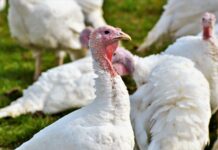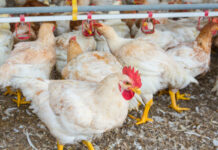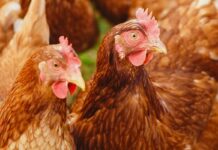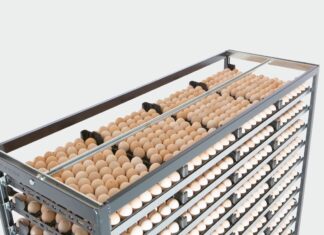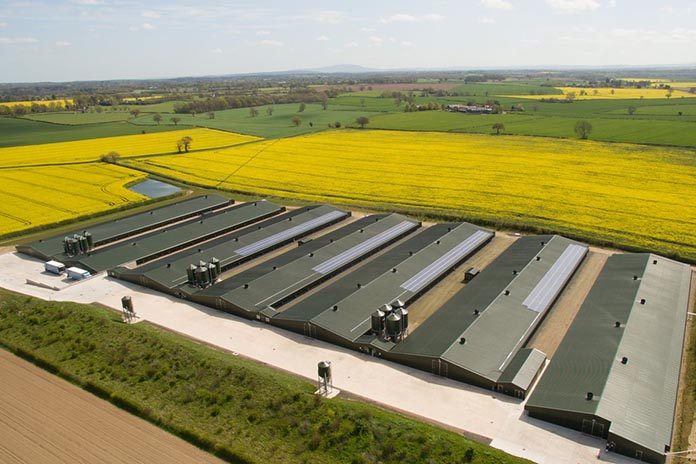
The theme of this year’s General Assembly of EU poultry sector was the sustainability of the poultry meat.
The event, organized by QGV, Austrian member of AVEC gathered more than 160 participants from 17 EU member states – all active stakeholders in the poultry value chain.
The president Paul Lopez, newly re-elected for a third mandate, made an overview of all the issues at stake for the sector while revealing the new version of the 2018 Annual Report.
Highlighting that poultry meat has now become the most eaten meat in the world, he pictured a relatively good situation of the sector, with increased production, slightly growing consumption and improvement of the trade balance. However, he underlined that EU continues to import products with much higher value (2,50 €/kg) than the products exported from the EU (1,20 €/kg).
Jens Schaps, representative of the EU Commission–DG AGRI described the sector as “a success story” and praised the EU poultry producers for their great adaptation capacity, received clear messages when it comes to trade issues from the AVEC President, who underlined that poultry meat has already paid a very high price on the altar of the free-trade agreements being the most imported meat in the EU by large and that upcoming trade negotiations should respect the sensitivity of the EU poultry meat production.
This was echoed by Mrs Elisabeth Köstinger, Austrian Minister for sustainability and tourism who honoured the AVEC audience with her presence. The Minister called for fair, well-designed and transparent free-trade agreements in her speech.
Paul Lopez stressed that the circumvention of the free-trade agreement by Ukrainian poultry producers is unacceptable and he underlined that the EU Commission must find a solution on this problem as soon as possible. He also emphasized the need for strong reciprocal measures towards South Africa who continues to impose unjustified trade restrictions on EU producers. On the offensive side, he reminded that the opening of the Chinese market for EU producers is seen as highly strategic, as it would guarantee an export outlet for products (in particular feet) for which the consumption in China complements the one in the EU, allowing a better valorization of the carcasses.
The Brazilian fraud scandal, which has led to the delisting of 20 plants by the EU authorities has highlighted critical deficiencies in the Brazilian poultry production. Similar deficiencies have been emphasized in recent audits performed by the EU Commission in Thailand and Ukraine, the two other main countries from which large quantities of poultry meat are imported to the EU. The AVEC President made clear that this should lead to a strong reinforcement of the controls at the EU border on the products imported from these countries.
He reminded that EU producers have to comply with the highest standards in the world for environment, food safety, animal health and welfare and that identical rules (and not just equivalent) should apply to third country producers all along the production chain, from farm to fork.
The labelling of origin for all products containing poultry meat is to that regard extremely important, in order to make sure that EU consumers can make an informed choice, as very often, imported poultry meat from third countries is used in processed products or food services, where the labelling of the origin of the meat is not mandatory.
Paul Lopez recalled that the health and welfare of animals is one of the cornerstones of the EU poultry producers who do everything they can to keep their animals healthy. If animals do become ill, they must be treated properly, and antibiotics may be required, but they should only be administered when necessary and only following a veterinary prescription. He added that the sector is committed to promoting the responsible use of antibiotics to minimise the risk of antimicrobial resistance.
Praising the good collaboration between the EU Commission services and the AVEC secretariat, the AVEC President concluded that a substantial work has been achieved until now but more remains to be done, especially on the trade side. By choosing European poultry meat, consumers all over the world make a quality choice and AVEC is committed to maintaining consumer confidence in our products via a high level of knowledge, innovation and transparency.
Later in the day, other speakers gave first class presentations on this year’s theme of sustainability. Nan Dirk Mulder, from Rabobank, described the economic aspects of a sustainable poultry production while Inmaculada de la Vega, from Mac Donald’s outlined the strategy of the restaurant chain to enhance their sustainable sourcing of poultry meat. Professor Von Wietzke from Humboldt University focused on the societal benefits of modern poultry meat production while Martin Scholten, from Wageningen University, presented a holistic approach of a sustainable poultry production.
AVEC also gave the opportunity to two NGOs, Eurogroup for Animals and RSPCA, to express their views on how they perceive sustainable poultry production.
Jean Kennedy from University College Dublin concluded the General Assembly on a positive note for the sector, underlining the numerous health benefits of poultry meat and inviting AVEC member to be proud of their production!
Source: AVEC www.avec-poultry.eu
For Avec 2018 Annual Report: http://www.avec-poultry.eu/resources/annual-reports/


